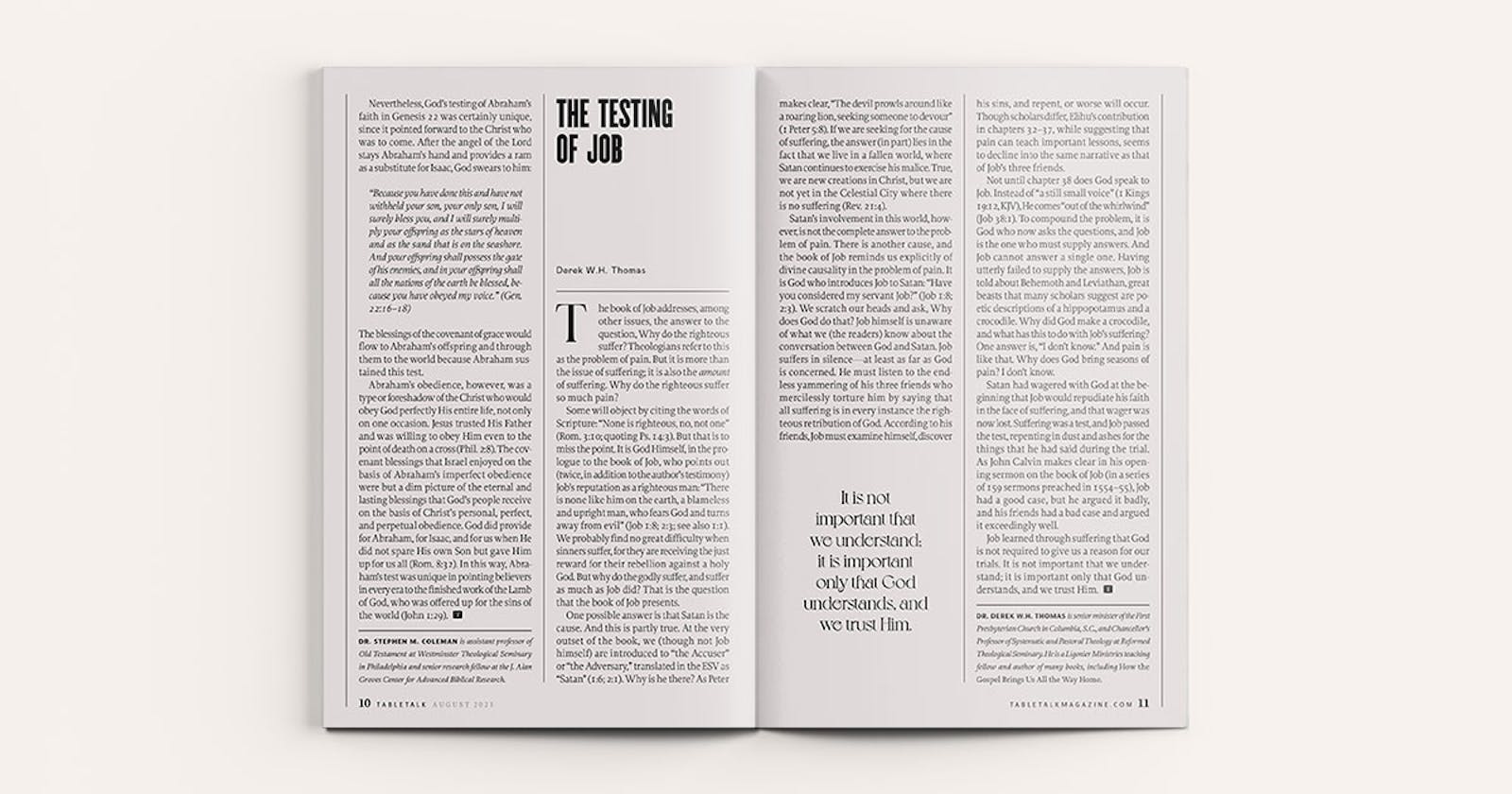
Request your free, three-month trial to Tabletalk magazine. You’ll receive the print issue monthly and gain immediate digital access to decades of archives. This trial is risk-free. No credit card required.
Try Tabletalk NowAlready receive Tabletalk magazine every month?
Verify your email address to gain unlimited access.
The book of Job addresses, among other issues, the answer to the question, Why do the righteous suffer? Theologians refer to this as the problem of pain. But it is more than the issue of suffering; it is also the amount of suffering. Why do the righteous suffer so much pain?
Some will object by citing the words of Scripture: “None is righteous, no, not one” (Rom. 3:10; quoting Ps. 14:3). But that is to miss the point. It is God Himself, in the prologue to the book of Job, who points out (twice, in addition to the author’s testimony) Job’s reputation as a righteous man: “There is none like him on the earth, a blameless and upright man, who fears God and turns away from evil” (Job 1:8; 2:3; see also 1:1). We probably find no great difficulty when sinners suffer, for they are receiving the just reward for their rebellion against a holy God. But why do the godly suffer, and suffer as much as Job did? That is the question that the book of Job presents.
One possible answer is that Satan is the cause. And this is partly true. At the very outset of the book, we (though not Job himself) are introduced to “the Accuser” or “the Adversary,” translated in the ESV as “Satan” (1:6; 2:1). Why is he there? As Peter makes clear, “The devil prowls around like a roaring lion, seeking someone to devour” (1 Peter 5:8). If we are seeking for the cause of suffering, the answer (in part) lies in the fact that we live in a fallen world, where Satan continues to exercise his malice. True, we are new creations in Christ, but we are not yet in the Celestial City where there is no suffering (Rev. 21:4).
Satan’s involvement in this world, however, is not the complete answer to the problem of pain. There is another cause, and the book of Job reminds us explicitly of divine causality in the problem of pain. It is God who introduces Job to Satan: “Have you considered my servant Job?” (Job 1:8; 2:3). We scratch our heads and ask, Why does God do that? Job himself is unaware of what we (the readers) know about the conversation between God and Satan. Job suffers in silence—at least as far as God is concerned. He must listen to the endless yammering of his three friends who mercilessly torture him by saying that all suffering is in every instance the righteous retribution of God. According to his friends, Job must examine himself, discover his sins, and repent, or worse will occur. Though scholars differ, Elihu’s contribution in chapters 32–37, while suggesting that pain can teach important lessons, seems to decline into the same narrative as that of Job’s three friends.

Not until chapter 38 does God speak to Job. Instead of “a still small voice” (1 Kings 19:12, KJV), He comes “out of the whirlwind” (Job 38:1). To compound the problem, it is God who now asks the questions, and Job is the one who must supply answers. And Job cannot answer a single one. Having utterly failed to supply the answers, Job is told about Behemoth and Leviathan, great beasts that many scholars suggest are poetic descriptions of a hippopotamus and a crocodile. Why did God make a crocodile, and what has this to do with Job’s suffering? One answer is, “I don’t know.” And pain is like that. Why does God bring seasons of pain? I don’t know.
Satan had wagered with God at the beginning that Job would repudiate his faith in the face of suffering, and that wager was now lost. Suffering was a test, and Job passed the test, repenting in dust and ashes for the things that he had said during the trial. As John Calvin makes clear in his opening sermon on the book of Job (in a series of 159 sermons preached in 1554–55), Job had a good case, but he argued it badly, and his friends had a bad case and argued it exceedingly well.
Job learned through suffering that God is not required to give us a reason for our trials. It is not important that we understand; it is important only that God understands, and we trust Him.
